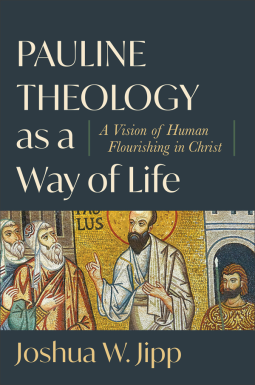
Pauline Theology as a Way of Life
A Vision of Human Flourishing in Christ
by Joshua W. Jipp
This title was previously available on NetGalley and is now archived.
Send NetGalley books directly to your Kindle or Kindle app
1
To read on a Kindle or Kindle app, please add kindle@netgalley.com as an approved email address to receive files in your Amazon account. Click here for step-by-step instructions.
2
Also find your Kindle email address within your Amazon account, and enter it here.
Pub Date Jul 25 2023 | Archive Date Aug 08 2023
Baker Academic & Brazos Press | Baker Academic
Talking about this book? Use #PaulineTheologyasaWayofLife #NetGalley. More hashtag tips!
Description
In this fresh approach to Pauline theology, respected scholar Joshua Jipp brings Paul's pastoral concerns to the fore, specifically his concern for human flourishing in his congregations. Jipp argues that Paul's writings are best understood as invitations to a particular way of life, one that is oriented toward the supreme good of experiencing life in God through participation in Christ. For Paul, Christ epitomizes the good life and enables others to live it. While analyzing Paul's thought through this lens of well-being and flourishing, Jipp introduces conversation partners as points of comparison and contrast. He interacts with ancient philosophy and modern positive psychology, both of which also address "the good life."
This important and substantial contribution to Pauline studies covers issues such as transcendence, suffering and death, relationships, pursuit of Christian virtue, and moral agency. It will be a valuable resource for all students of Paul. Now in paperback.
Advance Praise
“Entrepreneurs, bloggers, and talking heads of all sorts are all too happy to promote their visions of what makes for the ‘good life,’ but few people would connect that topic with the apostle Paul. Joshua Jipp begs to differ. In this informed and wide-ranging study, Jipp puts Paul’s Letters in conversation with both ancient philosophy and contemporary positive psychology. The result is an energetic invitation to read Paul’s theology as nothing less than ‘a way of life.’”—Beverly Roberts Gaventa, Helen H. P. Manson Professor Emerita of New Testament, Princeton Theological Seminary
“Jipp’s three-way conversation on the topic of human flourishing, involving ancient moral philosophers, contemporary exponents of positive psychology, and the apostle Paul, is brilliantly conceived and masterfully executed. Far from simply locating superficial similarities, Jipp vigorously interrogates the interlocutors, and in the process provides a rich and nuanced appreciation for Paul, not as a systematic theologian but as a pastor seeking to shape his readers into a distinctive way of life. A fresh and fascinating contribution to Pauline studies that can profitably be read by all students of the human condition.”—Luke Timothy Johnson, Robert W. Woodruff Distinguished Professor of New Testament and Christian Origins (Emeritus), Emory University
“Joshua Jipp’s new book is not so much an addition to the enormous mountain of books on Pauline theology as it is a consideration of what Pauline theology might be for to begin with. What is Paul up to, as it were, with all this theology? Jipp’s answer is at once both ancient and contemporary: Paul’s theology is aimed at the good life. It works to shape those for whom it matters into people whose Christlike transformation brings them deeper and deeper into what a good life actually is. Jipp is that rare combination of a prolific and thoughtful scholar, and this newest addition to his body of work shows learning and conceptual refinement. It is also a reframing of Paul in ways that are important to consider and also, as it turns out, existentially rich, pastorally relevant, and quietly inspiring.”—C. Kavin Rowe, vice dean for faculty and George Washington Ivey Distinguished Professor of New Testament, Duke Divinity School
“Does the apostle Paul have something relevant to say regarding how to live in the twenty-first century? In Pauline Theology as a Way of Life, Joshua Jipp argues not only that Paul has something to say about how to live in our world today but also that the apostle offers a powerful vision for human flourishing in our contemporary world. In this interesting analysis, which places Paul in conversation with philosophy and the field of positive psychology, the apostle emerges as a potent resource for humanity’s pursuit of the supreme good.”—Lisa M. Bowens, associate professor of New Testament, Princeton Theological Seminary
“Dr. Joshua Jipp’s new book makes a compelling case that Paul is centrally focused on the pursuit of human flourishing and happiness. Throughout his discussion, Jipp draws extensively on both ancient philosophy and contemporary positive psychology in ways that haven’t been explored before. The result is a masterful interdisciplinary exploration of Paul’s theology as a way of life. Highly recommended!”—Christian B. Miller, A. C. Reid Professor of Philosophy, Wake Forest University
“With remarkable skill, Joshua Jipp shows that even as Paul’s thinking about what constitutes the good life is uniquely and inextricably related to Christ, it can also be illuminated through careful comparison to both ancient philosophical and modern psychological efforts to attain true happiness.”—Matthew Thiessen, associate professor and chair of undergrad studies, McMaster University
Available Editions
| EDITION | Other Format |
| ISBN | 9781540965721 |
| PRICE | $37.99 (USD) |
| PAGES | 288 |
Available on NetGalley
Average rating from 3 members
Featured Reviews
If you sat down with Paul of Tarsus and asked him for a short explanation of what human flourishing looks like, what would he say?
Such is the question taken up by Joshua Jipp in Pauline Theology as a Way of Life: A Vision of Human Flourishing in Christ.
Of discussions regarding Paul and his theology there is no end, and most of them end up getting locked into the various doctrinal disputations which have marked successive phases of Christian doctrinal history.
The author has done well at setting aside most such things and to focus on the much more “practical” question, asking what Paul would think it is all about in the end.
To this end he introduces two conversation partners: ancient philosophy and modern positive psychology. The work begins by setting forth the narratives about each of these three: who they are and what they represent. The author then sets forth various theses regarding what Paul would suggest in terms of human flourishing, and compares and contrasts those premises with the perspectives which would be found in ancient philosophy and modern positive psychology.
The author well concludes his analysis: Paul would find human flourishing best in joint participation in the life of God in Christ through the Spirit, both with God and with fellow Christians, having died to sin and cultivating the fruit of the Spirit, and all with a view toward sharing in the resurrection of life. We can see where ancient philosophies and modern positive psychology are in alignment with this goal, yet neither could or would go as far as Paul would in these matters, and have very different end points because of their very different goals and frameworks.
Therefore, the premises and the conclusion are sound; the analysis requires some familiarity with the New Testament and Pauline theology but not necessarily at the scholarly level. This would be a profitable book for all Christians who wish to consider what Paul is actually about in the end, especially in light of the ancient philosophies and modern positive psychology which tend to animate many in the secular world and whose principles are often introduced, whether in ignorance or through malevolence, into Christian faith and exhortation.
Readers who liked this book also liked:
Pete Greig
Children's Nonfiction, Religion & Spirituality










